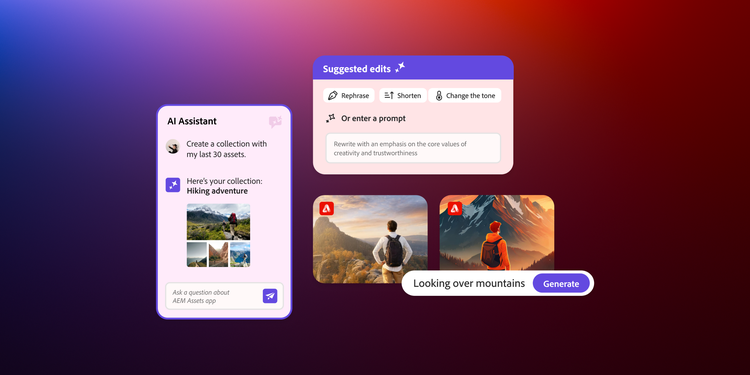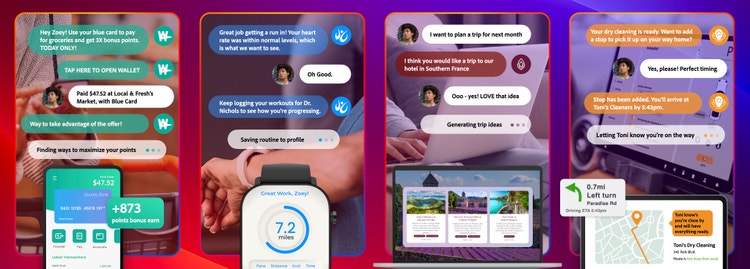Leading marketing and CXM in the age of Gen AI

Over the past decade, perhaps no C-suite role has evolved more rapidly and with more complexity than the Chief Marketing Officer. With the continued rise of cross-channel engagement and the digital-first consumer relationship the lines between marketing, sales, product, support and in-person experiences have blurred. In today’s world, your digital experience is your brand and increasingly, it’s also becoming your product. The modern CMO must function as a growth and strategy leader to stay in front of the competition.
And with higher pressure on growth and downward pressure on budgets, the modern CMO must be a master of the financial outcomes. As digital and streaming media continue to displace traditional media and social channels continue to evolve past the simple days of Facebook, acquiring, engaging and retaining customers is more difficult than ever. This means customer lifetime value matters more than ever. To stay ahead, brands in every industry must constantly raise the bar on their digital products and experiences and maximize their ability to acquire, engage, convert and retain customers.
The modern CMO must be a technologist and data guru to navigate across the technology, data, and complicated consumer journeys that define the brand experience. Delivering world-class digital experiences means intentionally designed end-to-end customer experience along with unified customer data, deep customer intelligence, amazing design, real time actions, unlimited content, relevant personalization, and connected customer journeys across multiple channels and devices. Consumers expect to be remembered, valued, and rewarded when they interact with your brand.
These collective requirements define a strategic imperative for every business — personalization at scale. CMOs are under siege to meet this imperative in order to give their business a competitive advantage and ultimately drive profitable growth through superior customer experiences.
As if the complexity wasn’t high enough, a new era of disruption is upon us with generative AI.
The world has changed — the promise, challenges, and pitfalls of generative AI
Most CMOs are under direct or implied pressure to harness generative AI to significantly increase productivity, yet breakthrough use cases of AI positively impacting business results remain out of reach. Adobe’s research, surveying over 8,000 marketers and executives, shows that while over 90% agree that AI will transform every marketing function, only 24% have developed an AI roadmap aligned with broader business goals, and even fewer companies have made substantial progress towards implementation. Moreover, there is clear risk in getting it wrong. Every CMO should be concerned about the brand and business impacts of generative AI improperly managed to ensure control, privacy, IP compliance, brand standards, and commercial safety.
But make no mistake, when harnessed effectively, generative AI will be transformative and usher in a new era of customer experience management and completely redefine what counts as personalization at scale.
The new standard for personalization at scale
While digital channels enabled a broad reach to consumers, the level of personalization has been relatively limited. It turns out that one-to-one personalization is difficult, and companies are ultimately resource constrained. Limitations on time, speed, people, expertise, data processing, creative content, offers — all of these are practical limits on the ability to personalize.
But imagine the possibilities if those limitations didn’t exist. The next level of AI intelligence will let brands the do incredible things:
- Communicate with customers via a conversational interface, creating true, real-time personalization.
- Incorporate all available data and unlimited customer segmentation.
- Perform next steps in service of customer outcomes.
- Ideate content and produce content variations tailored to channels and unique customers.
- Enable non-experts to operate sophisticated systems and technology, democratizing advanced tools and spurring productivity.
- Automate routine or mundane tasks, freeing up valuable human capital for creativity and decision making.
When we combine foundational Adobe technology, with the ability of generative AI to instantly and deliver experiences based on customer input (and the ability to direct delivery based on those interactions) we open a new stratosphere of what we mean by personalization and what counts as scale. Hyper personalized experiences, tailored to customers on a one-to-one basis with 24/7 always-on support.
A simple way to envision this new paradigm is via a trusted digital concierge.
Looking into the future: the trusted digital concierge
Envision a high-touch, highly capable concierge as the brand ambassador and interface between your brand and your customers. The current paradigm of search and exploration will be replaced in favor of conversational interaction and immediate simulation and trial.
For consumers, trusted digital personal assistants will serve as financial advisor, fashion consultant, healthcare advisor, travel agents, bringing curated recommendations, incorporating the customer’s immediate needs and preferences, and fulfilling those needs automatically.
Imagine what consumers could do with a digital concierge:
- Discuss and book travel options with a travel concierge who understands their budget, calendar, and interests, suggesting itineraries, flights, hotel, entertainment, dining, and activities — all while keeping an eye on the weather.
- Manage their finances with a personal banker who can recommend mortgage and insurance options, investment advice — even which credit card to use to maximize loyalty points — while also planning budgets and paying bills.
- Try on the latest fashion in a virtual mirror with the support of a fashion advisor and personal shopper who can recommend outfits based on personal style and exact measurements.
- Speak with a trusted digital healthcare advisor who understands their individual concerns, can recommend products, book a doctor’s visit — even congratulate them for exercising.

Brands will have the opportunity build a new level of customer relevance and customer loyalty. We can anticipate a massive level of disruption and a new era of competition. Winners and losers will emerge, and market share will be up for grabs. Consumers may choose to work with fewer brands because of the level of trust and amount of personal data needed for a digital concierge. New business models and entrants will emerge, upselling and cross-selling with third parties and AI subscriptions for customers who want a premium level of service.
We can’t predict all the ways generative AI will disrupt industries and markets, but we can say with confidence — change is coming, and fortune favors the prepared!
A new era for the CMO and their CXO partners
As CMOs, whether we’re focused on near-term productivity, medium-term enhancements to personalization at scale, or long-term reinvention of brand relationships, we can build the foundation for future success now. To embrace this new level of one-to-one personalization, CMOs must prepare their marketing organizations with the capabilities and the productivity and performance requirements of the future. And the future is here.
Adobe is making this easy by delivering pragmatic generative AI innovation directly into existing marketing workflows and tools. Furthermore, Adobe has set a high bar for commercial responsibility, and IP protection. We are delivering base models you can trust, custom models you can control, and infusing the AI into existing applications to deliver real impact.
This week at Adobe Summit, we laid the foundations for the future of customer experience management with innovation announcements across data, content and customer journeys. Adobe Experience Platform AI Assistant will support companies with the essential tasks needed from data engineers, audience specialists, and journey managers, to boost teams’ speed and productivity. Innovation with Federated Audience Composition and Real-Time CDP Collaboration will further augment the data capabilities of Adobe Experience Platform customers. Adobe is transforming the modern content supply chain through a new GenAI-first application, Adobe GenStudio.
With Adobe Firefly Services, brands can now train the model on their own IP and brand styles and use APIs to embed it into custom workflows, introducing greater efficiencies into content creation. Adobe Experience Manager Sites is also boosted by generative AI that gives marketers the power to create unlimited content variations instantly for personalization and experimentation.
Both B2C and B2B marketers now have improved journey orchestration tools. The newly announced Adobe Journey Optimizer B2B Edition helps B2B marketers and sales teams collaborate and drive personalized engagement with customer buying groups. New enhancements to Adobe Journey Optimizer helps B2C brands connect audience-centric campaigns with real-time customer signals to help them land experiences at just the right time.
In the era of GenAI, the future of digital marketing and customer experience management promises to be dynamic, challenging, and rewarding. The CMOs who embrace the potential will spur their companies to invest in this future and kick off a new era of customer relevance and productivity.
The potential is huge.
The challenge is real.
Adobe is ready to partner with CMOs to meet these challenges and redefine their brand’s future.